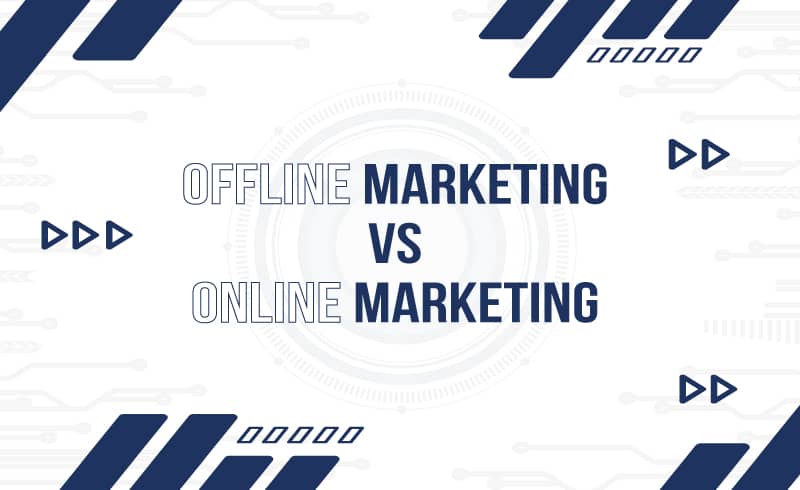
Marketing is an indispensable and popular industry nowadays, and the main purpose of marketing is to promote traffic. If any business wants to survive, it needs to continuously acquire customers, and the source of customers is traffic.
Each marketing strategy has its own advantages and disadvantages. Figure out which is more beneficial for your company in this marketing comparison between offline marketing and online marketing.
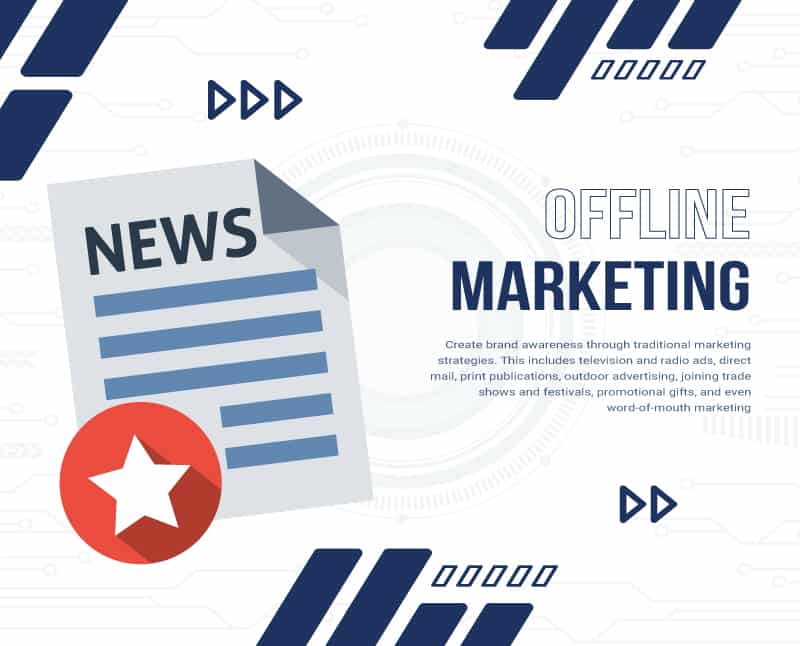
Offline Marketing refers to create brand awareness through traditional marketing strategies. These strategies do not involve the direct use of the Internet. This includes television and radio ads, direct mail, print publications, outdoor advertising, joining trade shows and festivals, promotional gifts, and even word-of-mouth marketing. Offline marketing strategies are better suited in fostering direct relationships with potential customers.
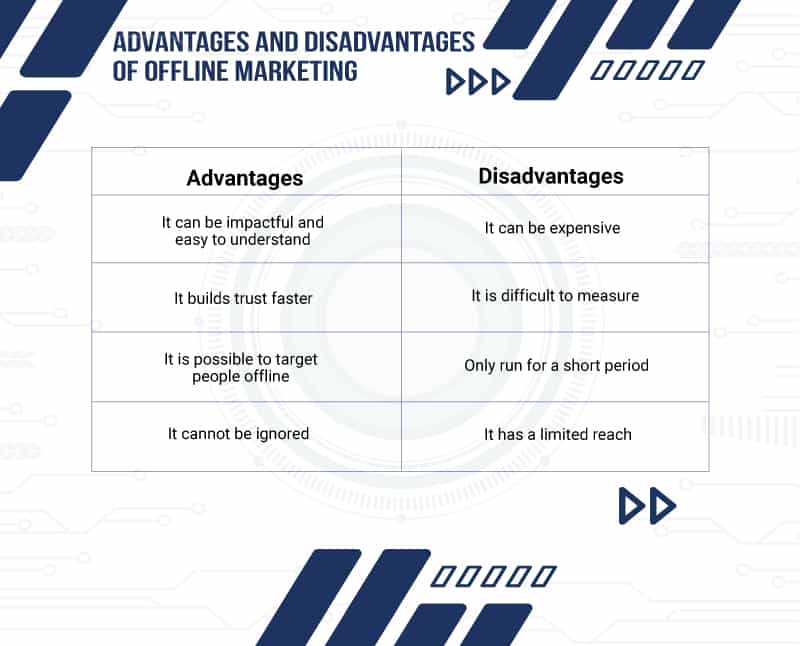
Advantages
- It can be impactful and easy to understand. A billboard or television advertising is likely to get ingrained in a person’s daily routine, making it simple to comprehend.
- It builds trust faster. In the perspective of the client, any firm that employs high-quality conventional marketing medium appears more trustworthy.
- It is possible to target people offline. A huge portion of the population, the elder generation, those who chose to switch off, and all those who are not online for any reason. Brands can target these people with offline marketing.
- It cannot be ignored. When people go out into the world, they are exposed to many sorts of offline marketing, whether they want it or not. It might be in the shape of billboards, radio commercials, product packaging, or even a leaflet handed out on the street.
Disadvantages
- It can be expensive. Other means of offline marketing, such as magazines, billboards, and television commercials, are more expensive than print marketing. This is attributable to labour, manufacturing, distribution, and advertising space costs.
- It’s difficult to measure. Though marketers have discovered techniques to measure the effectiveness of some offline marketing materials, their method of tracking is limited.
- Only run for a short period. Offline marketing does not survive as long as internet marketing strategies. If you want your TV or print ad to stay in the public eye, you must republish it on a regular basis. The costs will be high in the end.
- It has a limited reach. Everything depends on your marketing budget. It will be difficult to target areas outside of your neighbourhood if you have a limited budget.
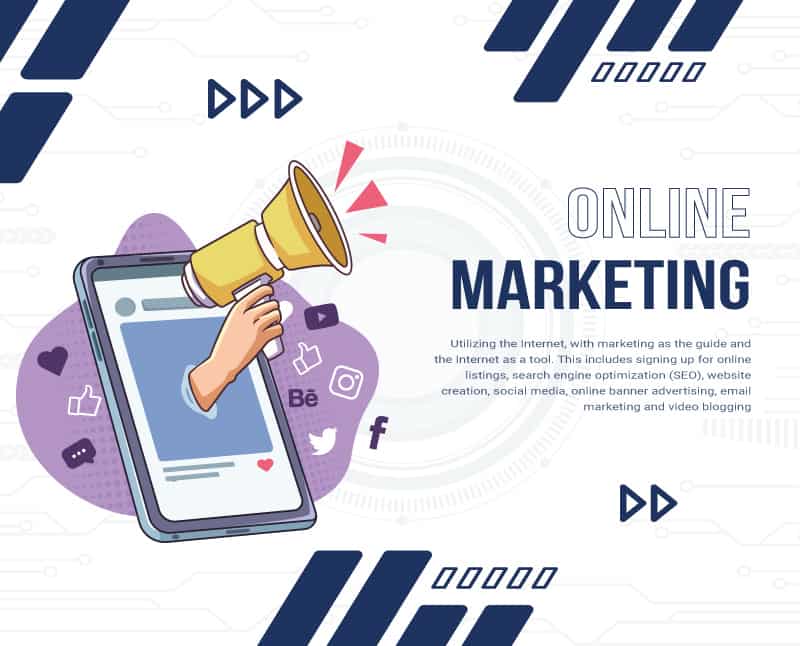
Online Marketing is utilizing the Internet, with marketing as the guide and the Internet as a tool. This includes signing up for online listings, search engine optimization (SEO), website creation, social media, online banner advertising, email marketing, video blogging, and more. Marketers use Internet channels to promote products, enhance the company’s brand image, and let more people know about the brand/product in order to better enhance the brand.
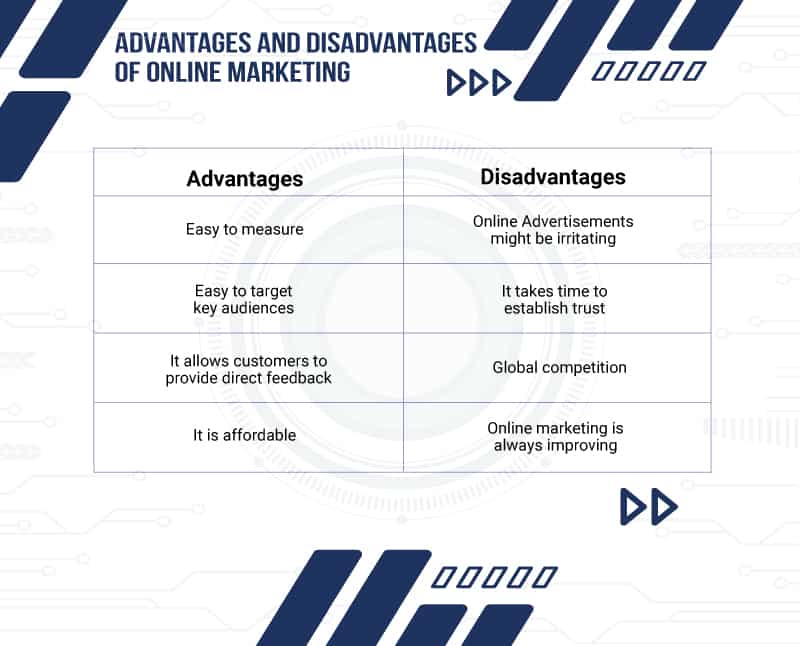
Advantages
- Easy to measure. Using online tools, you can readily examine real-time outcomes and calculate the return on investment (ROI) of online marketing initiatives. You can check how many impressions, likes, views, shares, and even purchases have been made.
- Easy to target key audiences. When producing an online ad, you have complete control over who receives it, allowing you to reach just those who match your target demographic. You don’t waste money by showing your ads to people who aren’t interested.
- It allows customers to provide direct feedback. If customers have any comments, questions, or criticisms about your business, they can simply write an email or leave a comment on your blog. Meanwhile, you may promptly respond to their concerns by using the proper channels.
- It’s affordable. Online advertising is generally less expensive than offline advertising. As a result, online marketing makes it easier for new brands with little costs to reach their target audience, particularly through means like social media, which can be absolutely free.
Disadvantages
- Online Advertisements might be irritating. Advertisers may target ads to you specifically, giving you ads for things you searched for days before, which is undoubtedly intelligent, but it can also be annoying and potentially drive you away from a business.
- It takes time to establish trust. When people engage in online activities, they are always vulnerable to online fraud, fraudulent links, hacking, and data breaches. This makes it difficult for customers to believe anything they see on the internet.
- Global competition. One of the major advantages of the internet is that it allows small businesses to access worldwide markets. While this is advantageous in certain ways, it also means that your company will face intense competition. In such an oversaturated industry, if your ads aren’t up to par, they won’t stand out.
- Online marketing is always improving. There’s always something new to learn, whether it’s the latest social media platform or a tweak in the search engine algorithm. You may find yourself falling behind if you do not keep up with latest trends.
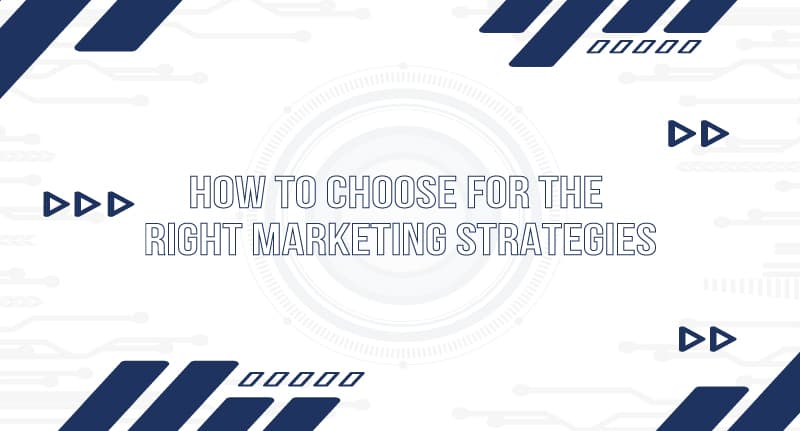
Know Your Target Audience
Selecting a marketing strategy while keeping right target audience should be one of the most important requirements. The chosen marketing methods should correspond to the target audience’s timing and location. It’s critical to figure out how to engage with customers, including potential social media outlets, purchase habits, and even interests and preferences. Identify the ‘who’ and ‘what’ elements is critical for every company initiative to thrive.
Consider Your Budget
The budget available is undoubtedly the most important decision element for each brand. As a brand manager, you must assess your financial situation and determine what you can afford. Even a less expensive marketing approach can yield outstanding results when done with care and attention.
Recognize the End Goal
A clear and well-defined goal is essential for a successful marketing strategy. This is because a little directed goal is preferable than a rudderless goal, the targets might be quite small. The goals might be monetary or data-driven, such as increasing sales, improving new lead creation, and establishing high brand value, among others. As a result, having an ultimate aim only aids in determining which approaches or strategies to use.
Keep Your Brand’s Identity
You should also think about what would work best for your brand. While certain forms of marketing might help to strengthen your brand identification, others can actually work against it. If you want to improve your whole brand identity, you should choose for more reliable marketing and advertising tactics.
Both online and offline marketing have advantages and disadvantages. Both aren’t ideal in every case, and there’s always space for development or an unforeseen shift in how marketing and audiences interact. Online marketing, on average, provides higher value invested. However, as seen above, offline marketing may occasionally work just as well, if not better, than online marketing. When used together, they usually function much better.
We hope the above information can help you in choosing a most suitable marketing strategies for your business and brand. For more questions about marketing, please do not hesitate to contact us.

Marketing is an indispensable and popular industry nowadays, and the main purpose of marketing is to promote traffic. If any business wants to survive, it needs to continuously acquire customers, and the source of customers is traffic.
Each marketing strategy has its own advantages and disadvantages. Figure out which is more beneficial for your company in this marketing comparison between offline marketing and online marketing.

Offline Marketing refers to create brand awareness through traditional marketing strategies. These strategies do not involve the direct use of the Internet. This includes television and radio ads, direct mail, print publications, outdoor advertising, joining trade shows and festivals, promotional gifts, and even word-of-mouth marketing. Offline marketing strategies are better suited in fostering direct relationships with potential customers.

Advantages
- It can be impactful and easy to understand. A billboard or television advertising is likely to get ingrained in a person’s daily routine, making it simple to comprehend.
- It builds trust faster. In the perspective of the client, any firm that employs high-quality conventional marketing medium appears more trustworthy.
- It is possible to target people offline. A huge portion of the population, the elder generation, those who chose to switch off, and all those who are not online for any reason. Brands can target these people with offline marketing.
- It cannot be ignored. When people go out into the world, they are exposed to many sorts of offline marketing, whether they want it or not. It might be in the shape of billboards, radio commercials, product packaging, or even a leaflet handed out on the street.
Disadvantages
- It can be expensive. Other means of offline marketing, such as magazines, billboards, and television commercials, are more expensive than print marketing. This is attributable to labour, manufacturing, distribution, and advertising space costs.
- It’s difficult to measure. Though marketers have discovered techniques to measure the effectiveness of some offline marketing materials, their method of tracking is limited.
- Only run for a short period. Offline marketing does not survive as long as internet marketing strategies. If you want your TV or print ad to stay in the public eye, you must republish it on a regular basis. The costs will be high in the end.
- It has a limited reach. Everything depends on your marketing budget. It will be difficult to target areas outside of your neighbourhood if you have a limited budget.

Online Marketing is utilizing the Internet, with marketing as the guide and the Internet as a tool. This includes signing up for online listings, search engine optimization (SEO), website creation, social media, online banner advertising, email marketing, video blogging, and more. Marketers use Internet channels to promote products, enhance the company’s brand image, and let more people know about the brand/product in order to better enhance the brand.

Advantages
- Easy to measure. Using online tools, you can readily examine real-time outcomes and calculate the return on investment (ROI) of online marketing initiatives. You can check how many impressions, likes, views, shares, and even purchases have been made.
- Easy to target key audiences. When producing an online ad, you have complete control over who receives it, allowing you to reach just those who match your target demographic. You don’t waste money by showing your ads to people who aren’t interested.
- It allows customers to provide direct feedback. If customers have any comments, questions, or criticisms about your business, they can simply write an email or leave a comment on your blog. Meanwhile, you may promptly respond to their concerns by using the proper channels.
- It’s affordable. Online advertising is generally less expensive than offline advertising. As a result, online marketing makes it easier for new brands with little costs to reach their target audience, particularly through means like social media, which can be absolutely free.
Disadvantages
- Online Advertisements might be irritating. Advertisers may target ads to you specifically, giving you ads for things you searched for days before, which is undoubtedly intelligent, but it can also be annoying and potentially drive you away from a business.
- It takes time to establish trust. When people engage in online activities, they are always vulnerable to online fraud, fraudulent links, hacking, and data breaches. This makes it difficult for customers to believe anything they see on the internet.
- Global competition. One of the major advantages of the internet is that it allows small businesses to access worldwide markets. While this is advantageous in certain ways, it also means that your company will face intense competition. In such an oversaturated industry, if your ads aren’t up to par, they won’t stand out.
- Online marketing is always improving. There’s always something new to learn, whether it’s the latest social media platform or a tweak in the search engine algorithm. You may find yourself falling behind if you do not keep up with latest trends.

Know Your Target Audience
Selecting a marketing strategy while keeping right target audience should be one of the most important requirements. The chosen marketing methods should correspond to the target audience’s timing and location. It’s critical to figure out how to engage with customers, including potential social media outlets, purchase habits, and even interests and preferences. Identify the ‘who’ and ‘what’ elements is critical for every company initiative to thrive.
Consider Your Budget
The budget available is undoubtedly the most important decision element for each brand. As a brand manager, you must assess your financial situation and determine what you can afford. Even a less expensive marketing approach can yield outstanding results when done with care and attention.
Recognize the End Goal
A clear and well-defined goal is essential for a successful marketing strategy. This is because a little directed goal is preferable than a rudderless goal, the targets might be quite small. The goals might be monetary or data-driven, such as increasing sales, improving new lead creation, and establishing high brand value, among others. As a result, having an ultimate aim only aids in determining which approaches or strategies to use.
Keep Your Brand’s Identity
You should also think about what would work best for your brand. While certain forms of marketing might help to strengthen your brand identification, others can actually work against it. If you want to improve your whole brand identity, you should choose for more reliable marketing and advertising tactics.
Both online and offline marketing have advantages and disadvantages. Both aren’t ideal in every case, and there’s always space for development or an unforeseen shift in how marketing and audiences interact. Online marketing, on average, provides higher value invested. However, as seen above, offline marketing may occasionally work just as well, if not better, than online marketing. When used together, they usually function much better.
We hope the above information can help you in choosing a most suitable marketing strategies for your business and brand. For more questions about marketing, please do not hesitate to contact us.



